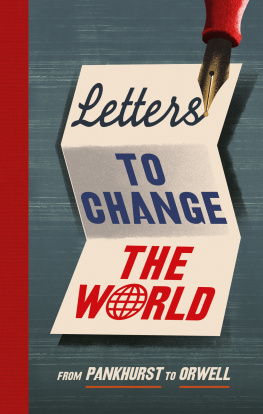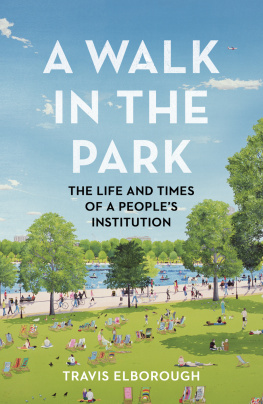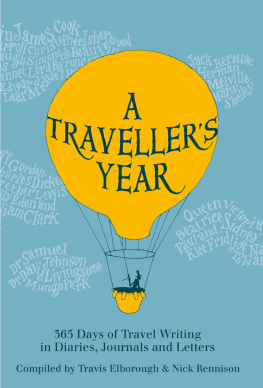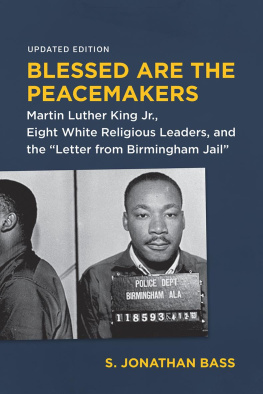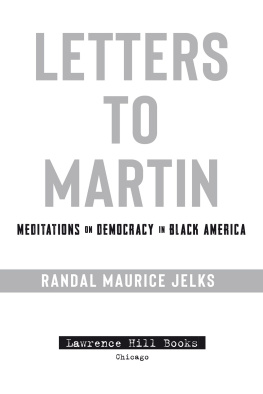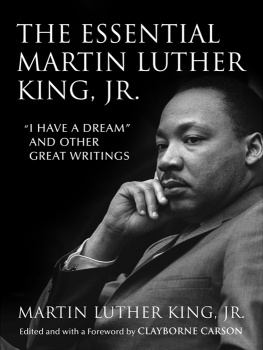Contents
About the Book
We know through painful experience that freedom is never voluntarily given by the oppressor; it must be demanded by the oppressed Martin Luther King
In an era where the liberties we often take for granted are under threat, Letters To Change the World is a collection of inspiring letters offering reminders from history that standing up for and voicing our personal and political beliefs is not merely a crucial right but a duty if we want to change the world.
Edited by Travis Elborough, the collection includes George Orwells warning on totalitarianism, Martin Luther Kings Letter from a Birmingham Jail, Albert Camus on the reasons to fight a war, Bertrand Russell on peace, Emmeline Pankhurst rallying her suffragettes, Nelson Mandelas letter to his children from prison and Times Up on the abuse of power.
About the Author
Described as one of Britains finest pop culture historians by The Guardian, Travis Elborough has been a freelance writer, author, broadcaster and cultural commentator for nearly two decades, and frequently appears on BBC Radio 4 and Five Live. His books include a history of Londons iconic Routemaster bus, The Bus We Loved (2005) and London Bridge in America: The Tall Story of a Transatlantic Crossing (2013). A Walk in the Park: The Life and Times of a Peoples Institution was published to great acclaim in 2016, with William Boyd declaring it a fascinating, informative, revelatory book. Our History of the 20th Century: As Told in Diaries, Journals and Letters (2017) was hailedby David Kynaston as a wonderfully curated collection of intimate diary voices: rich in their variousness, compelling in their impact, and cumulatively giving us a fresh and thought-provoking version of twentieth-century Britain.
Editors Note
Letters have been edited in places for length, clarity and sense but where possible the authors spellings and grammar have been retained to remain as true as possible to the original correspondence.
Introduction
At a time when the liberties we often take for granted seem to be under threat, Letters to Change the World is intended to offer reminders from history that, if we want to change the world, standing up for and voicing our personal and political beliefs is both a right and a duty.
From William Wilberforce and Emmeline Pankhurst through to Nelson Mandela and Ziauddin Yousafzai, father of Malala, many of the letters collected here are penned by major figures from the world stage. Poets, writers and thinkers such as Leo Tolstoy, Bertrand Russell, Wilfred Owen, Doris Lessing and Alice Walker have also been included, while other letters are written by ordinary citizens caught up in history by their pursuit of what is right. The little-known and downright obscure also take their place here among the great and the good the former have often achieved great things by the simple act of putting pen to paper. The fight for the right to work and to be respected whatever your gender, sexuality or skin colour has long been a battle of words. That the personal is political is hopefully writ large across these pages. Printed discourse is good for democracy; we need to talk openly and honestly to each other to avoid totalitarianism in all its stripes, and to speak truth to power when we see it being abused.
Our collection begins in the eighteenth century, the era of the Enlightenment but also of Rotten Boroughs, transatlantic slavery and punitive penal codes, when the majority of the worlds population remained disenfranchised. And the books finale finds us in the contemporary age of digital clicktivism and online petitions where, perhaps against all expectations, the open letter, a form so beloved of the coffee-house radicals and bar-room revolutionaries of yesteryear, has been reborn. History, it would appear, genuinely favours the epistolary. Ink and paper might be absent from many modern-day calls for action, but their sentiments are surely no less worthy or necessary. The gig economy and the insecure nature of work for the precariat, and present-day, even everyday sexism, homophobia and racial prejudice are sadly not without their precedents, as the odd example here shows, though others provide more reassuring evidence of the valiant gains made in the intervening decades and centuries. But over a century since the suffragettes, #MeToo and Times Up tell us there is far more work yet to do.
Inevitably there are absences and omissions. Still, we believe there is enough ammunition in this anthology to encourage those who dream of improving the world to wield their pens (or keyboards, phones and iPads) ever mightier than swords, and change the world for the better.
1
William Wilberforces Letter to Thomas Jefferson on Slavery, 1808
Incomprehensible as it might seem to us now, at the time of William Wilberforces birth in 1759, slavery and the trafficking of human beings, mostly from Africa to the Americas and the Caribbean, was largely considered an unremarkable fact of life. History was on its side: slavery had been practised by the earliest human civilisations, including such pioneers of democratic government as the Ancient Greeks. Even more horrifyingly, it remains with us today. But in Britain in the latter half of the eighteenth century, abolitionists such as Thomas Clarkson, Granville Sharp, the former enslaved African Olaudah Equiano and William Allen, a Quaker who foreswore sugar (one the chief products of slave labour) for over forty years, began to campaign against slavery on moral and religious grounds.
Wilberforce was the son of a wealthy merchant and the MP for his home town of Hull. Before finding God in 1784, hed led a fairly dissolute life. Following his conversion to evangelical Christianity though he renounced his former vices and became a leading advocate of social reform. Convinced by his faith that slavery was a sin for which Britain had to repent or be damned, Wilberforce devoted the next twenty years lobbying the government to abolish the trade and emancipate the Africans sold as chattel. After many failed attempts to get legislation through parliament, in 1807 he finally succeeded in carrying a motion ending the trade in Britain. Nevertheless it would take a further twenty-six years before slavery itself was finally made illegal.
During this period, Wilberforce and his fellow abolitionists continued to press for the emancipation of all slaves. Wilberforce was a founding member of the African Institution, an organisation headed by the Duke of Gloucester that, in the words of one historian, carried the national anti-slavery torch throughout the next decade. Among their chief concerns was ensuring that the law, as it stood, was upheld.
Though the trade had been abolished, the punishment for breaking the law was initially limited and the ability of the British to enforce it weak. The Navy could not board suspected British slave ships sailing under foreign colours. America was a particular problem: although the United States Congress had outlawed the African slave trade in 1808, not long after Britain, domestic trade there continued unabated. The demand for labour, particularly in the south, led to a blind eye often being turned on illegally sourced slaves. In December 1810, President Madison confessed to Congress that American citizens were still instrumental in carrying on a traffic in enslaved Africans, equally in violation of the laws of humanity and those of their own country.

